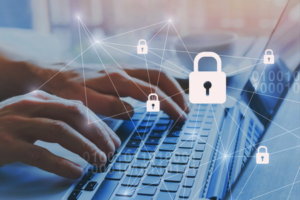Resolve to Protect Your Financial Data
 Ringing in the new year inspires us to set goals to improve ourselves. While you may not be able to stick to that new diet past the end of January, you can and should be able to take steps to better secure your financial information.
Ringing in the new year inspires us to set goals to improve ourselves. While you may not be able to stick to that new diet past the end of January, you can and should be able to take steps to better secure your financial information.
At Safeguard we operate in a world both digital and financial. While the internet makes it easy for us to efficiently serve clients across the country, we are keenly aware of the risks surrounding handling sensitive financial data and take many precautions with our own practices to ensure the highest level of security.
Whether you are interacting with our team to get your self-directed IRA or Solo 401(k) plan setup, using your plan to make investments, or handling any financial transaction for that matter, the following steps can help keep your information safe.
Good Password Habits are Priority #1
Passwords are the keys to our online lives. You would not hand your house keys to a stranger on the street, so why be careless in the online world?
Use strong passwords and PINs that mix numbers, letters, and symbols.
Be sure not to reuse passwords, because if one site is hacked the first things cybercriminals will do is try that password on as many other sites as possible.
Change your passwords regularly. A refresh at least quarterly is a best practice.
Never share passwords with others and do not store them in plain text on your devices.
Using a password manager is really the best way to go.
Maintain Computer Security
Be sure to keep your devices secure with regular updates to the operating system and core applications.
Use a firewall on your internet connection and security software on your devices that provides anti-virus, anti-malware, and spyware detection.
Encrypting the data on your devices is a good idea.
Use Secure Networks
The best place to handle financial transactions is on your owns systems, connected to your own home or business private network.
The convenience of taking care of business anywhere from a mobile device is tempting but creates risk exposure. The local coffee shop or airport wi-fi network can easily be targeted by digital predators.
If you must access your financial services from a remote location, using a VPN can be a means to do so more securely.
Use 2-Factor Authentication
Whenever possible, take advantage of services that provide some form of two-factor authentication to verify your identity. This protects your login information and helps you know you are accessing the service you intend securely.
Be Careful with Links and Downloading
Make sure to only access internet links and access file downloads from people or business you know and are currently working with.
Many phishing attacks will attempt to get you to click on a link or download a file by pretending to be a company you do business with.
If you hover over a link, it should display the destination URL. If you do not recognize the URL or it does not match the company that supposedly sent the email, do not click on it.
Protect Sensitive Information
No reputable company will ask you for sensitive personal information in an email. Never put personal information such as your SSN or financial account numbers in an email. Attaching a document to an email is also insecure.
One of our least favorite emails to receive is “I’m Joe Smith and my account number is #####. Can you please answer the following question?” We do not need Joe’s account number to answer a general question, and can easily look that up if we do need it. If someone has compromised Joe’s email, he has just given them something that can easily be exploited.
If you do need to share sensitive information, make sure it is being done over a secure channel such as a HTTPS web form or encrypted file transfer service.
Because our services require the collection of sensitive information, we utilize secure platforms for information exchange. Please take advantage of these services to protect your data.
Regularly Check Your Account Statements
Make sure to login to all your financial accounts on a periodic basis and review the account activity or statements. A quarterly checkup is a good idea, but monthly is even better. In the unlikely event you are compromised, the quicker you can identify the problem, the easier it is to protect yourself and seek remedy.
When In Doubt, Call
If you receive a request for sensitive information, a file download you may not be expecting, or a change to wiring instructions, it can be best to err on the side of caution. Pick up the phone, call the number you already have on file – not one that may be included in a suspect email – and verify the request is legitimate.
Safety is a State of Mind
It does not need to be difficult to take basic steps to protect your financial data. The most important step is simply realizing the importance of doing so.
Talk to An Expert Today!
Learn these little known strategies and tactics, and unlock your retirement plan today.
